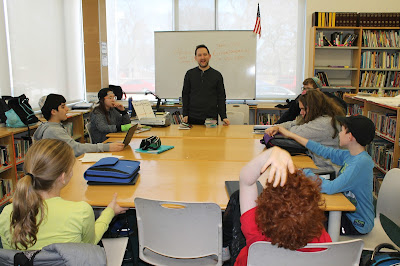The Global Citizen Check-In
Mr. Millner considers himself as way more than the 5th/6th Language Arts teacher (He's also our basketball coach and 7th/8th grade gym teacher but that's beside the point of this blog post.).
Teaching life skills
"Learning to annotate and being able to defend arguments with facts are my main academic goals for them, but even there I believe in practicing what I preach. Our class has no text book. Rather, I bring my own annotated version of the novel we're currently reading and that tells me that chapter 5 is a good one to talk about similes. And of course I show the kids my annotated pages."
But in order to reach any of these goals, students need good executive functioning skills, such as bringing pencil and book to class so they can actually annotate. He's been working on quantifying some of what he teaches, and so he recently had his students complete a survey to evaluate themselves as global citizens.
Why have them evaluate themselves?
"From morning till night," says Mr. Millner, "someone is telling a kid what to do, and so they tune out. Therefore I’m not telling them what to do. I'm not filling out their survey. If they fill it out themselves, they are more invested in the results and especially in the goals they set for themselves. In addition, self reflection is a skill in and of itself. I want the kid to realize for himself that he would be more prepared in class if he brought his pencil, and he is more likely to actually do it if he set that goal himself."
The kids evaluated themselves on these questions:
Afterwards Mr. Millner met with students one on one to get a sense of why they rated themselves the way they did, but also to talk about two goals they wanted to set for themselves to improve in these areas and to discuss strategies to achieve those goals. They will have a check-in meeting at the end of the school year.
"These meetings gave me a deeper appreciation of them as well," Mr. Millner found. "There was one student, for example, who I thought deserved fives, but he told me, 'nobody is perfect,' and gave himself fours. Obviously this child holds himself to a high standard!" While Mr. Millner was sometimes surprised by their goals, none of the students had problems picking goals.
When discussing these executive functioning skills, Mr. Millner shares his adult perspective with his students. "The other day I misplaced my building key card," he said. "It stressed me out the whole day until I found it sitting on my desk where I must have left it the day before rather than putting it in the pocket where I usually keep it. I hope that hearing about these everyday adult challenges helps the kids internalize how important these daily skills are and how much they affect our success in life, but also that it is an ongoing struggle, and that, as one of my students said, nobody is perfect, not even adults."
"These meetings gave me a deeper appreciation of them as well," Mr. Millner found. "There was one student, for example, who I thought deserved fives, but he told me, 'nobody is perfect,' and gave himself fours. Obviously this child holds himself to a high standard!" While Mr. Millner was sometimes surprised by their goals, none of the students had problems picking goals.
When discussing these executive functioning skills, Mr. Millner shares his adult perspective with his students. "The other day I misplaced my building key card," he said. "It stressed me out the whole day until I found it sitting on my desk where I must have left it the day before rather than putting it in the pocket where I usually keep it. I hope that hearing about these everyday adult challenges helps the kids internalize how important these daily skills are and how much they affect our success in life, but also that it is an ongoing struggle, and that, as one of my students said, nobody is perfect, not even adults."








Comments
Post a Comment